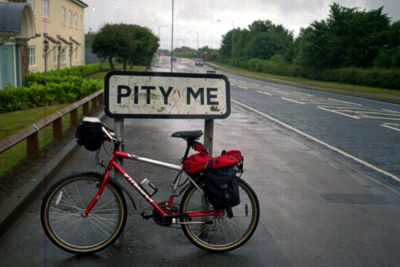Some are realer than others
Some are realer than others
Replies sorted oldest to newest



Rude' English streets defended | ||||||
New road names with rude connotations could soon be banned in part of Sussex to avoid "deliberate misinterpretation". But throughout England streets including "Grope Lane" and "Titty Ho" have a rich history. Lewes District Council wants to clean up its street names. The local authority believes it will help emergency and postal services by carefully vetting what new roads are called. A report says "aesthetically unsuitable" names such as Gaswork Road, Tip House and Coalpit Lane should also be avoided, along with any double entendres. But Rob Bailey, co-author of Rude UK, believes rude-sounding place names have a cultural significance.
The book, along with later publications Rude World and Rude Britain, explores the history of such names including Weeford, in Staffordshire, Scratchy Bottom, Dorset and Lickey End in Worcestershire. Slag Lane in Haydock, Merseyside, for example, got its name from the coal slag heaps which used to characterise the area, Mr Bailey said. While Juggs Close, in Lewes itself, is thought to have got its name from baskets in which fish were carried (known as juggs). "I think sanitising [street names] takes away the industry and distinctiveness of many areas like the sluicing of the fens or the coal-mining of the north," Mr Bailey said.
The idea from Lewes council is nothing new. In the late 1800s authorities amended a number of street names deemed inappropriate, he said. "This latest sanitation is redolent of what the Victorians would have been doing in the past when they tried to get rid of some of the richest road names that we have." Mr Bailey, who grew up in a place in Oxfordshire called Tumbledown Dick, said he feared vetting new road signs could lead to "mediocre and meaningless" names spreading across the country. But some residents who live in strangely-named places do find it a struggle. Tired of pranks In 2003 Paul and Lisa Allott moved from their bungalow in Conisbrough, South Yorkshire, after becoming fed up of living in Butt Hole Road. The family said they had grown tired of groups of youths posing for photographs by a street sign near their front wall with their buttocks bared. Taxis and delivery men often failed to turn up, as they did not believe the road existed, Mr Allott said. Mr Bailey believes the name may have originated as a reference to a nearby water source.
Dr Oliver Padel, president of the English Place Name Society, based in Nottingham, said street names which today could have double meanings existed for many reasons. "Sometimes a name had a completely different meaning and it developed over the years into something now we can potentially see as having a rude meaning. "On the other hand some roads were supposed to have an intended meaning." Grope Lane, in Shrewsbury, Shropshire, for example, was once the town's red-light district, he said. "I think very often the names do enshrine part of the local history and it's desirable to keep the name when you can. "I would say that a name is a historic document in itself - they deserve to be recognised." | ||||||
I have a pain ahahahahaaa
Much hilarity was had at saying Spot the dog... spot the man... CAN YOU FEEL A SPOT OF RAIN... The list is endless, i just couldn't speak for laughing by the time we had run through loads .... you had to be there.

 Im laughing my socks off, hahaha, at all these.
Im laughing my socks off, hahaha, at all these. lmao
lmao
 Its never ending
Its never ending 


Ive just noticed what exit you turn off at Big Beaver ahahahahaaaaaaaa


By Tom Warren
New road names with rude connotations could soon be banned in part of Sussex to avoid "deliberate misinterpretation".

It's in Brum, near the Lickey Hills, Lickey End and Wetty Lane ![]()





I noticed a few of these said place where close by some other compatible named places lol






